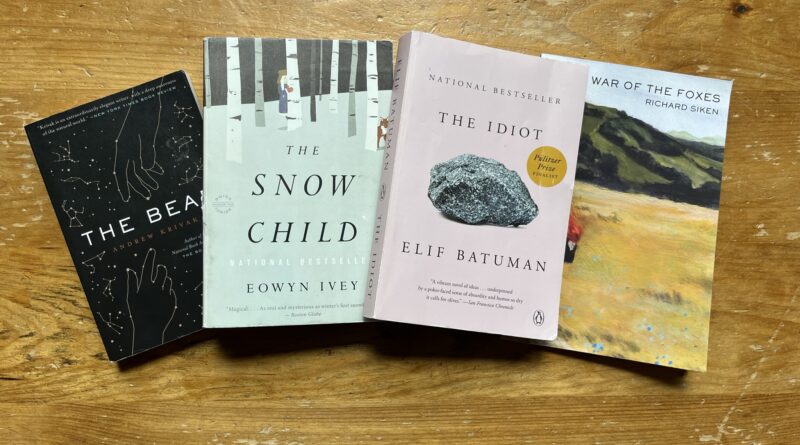March is National Reading Month: An English major’s top picks
I became an English major because of a genuine love for reading. I love to get swept up in a new story and attached to a new set of characters, and I especially love talking about the books I’ve read. With my major, that’s how I spend most of my time.
The danger, however, is that when you have to fill your days reading things you didn’t get to choose, the intrinsic love of books can be easily crushed. To combat this, I have been trying to make reading solely for enjoyment a regular self-care practice.
March is National Reading Month, and in the spirit of the occasion, I have spent the last few weeks immersing myself in non-required reading every chance I get. If you’re looking for a recommendation, or you’re simply feeling curious about what book-loving English majors might read when they don’t have an essay to write, read on for honest reviews of four great books.
“The Bear” by Andrew Krivak is a modern folktale about the interconnectedness of all things. Set far in the future, the story follows the last two people on earth: a young girl and her father. We watch as the girl’s father equips her with survival skills and teaches her to remember her mother in all that she does. When the girl finds herself alone in the wilderness, she finds guidance and comfort in a bear who accompanies her while teaching her how to commune with the natural world.
This book is a short and sweet novel with a simple, reflective writing style. While at times I found it a bit slow-paced for my liking, a lack of action makes sense, considering the themes and tiny cast of characters. Gorgeous descriptions of nature and careful attention to detail when describing practices like fishing or foraging encourage the reader to view the natural world in a more gentle, empathetic light.
If you’re looking for a heartwarming story about family with a bit of magical realism, “The Snow Child” by Eowyn Ivey may be a good option for you. This story follows an older couple living in the Alaskan wilderness. They have always longed for children, but are unable to have any of their own. In a moment of playfulness, they build a child out of snow, which disappears the next day and seemingly reappears in the form of a young girl at their doorstep.
Relationship dynamics are the main focus of “The Snow Child.” We see a husband and wife whose relationship is strained by grief, their relationship with the young girl they come to love as their own, and the friends that keep them company during the harsh Alaskan winters. All of these characters have depth and emotional complexity that I thought were explored nicely, and the mysterious tone kept me hooked.
“The Idiot” by Elif Batuman is a great choice if realistic fiction is more your style. This book follows Selin, daughter of Turkish immigrants, throughout her freshman year at Harvard. With a witty and sarcastic narrative voice, Selin takes the reader through her experiences with new friendships, the struggle of finding one’s place in college, and the complications of first love.
Of all the books I read this month, “The Idiot” was definitely my favorite. I thoroughly enjoyed the humor provided by Selin’s internal dialogue, and there were many instances where the characters were placed in situations that felt so vividly like my own college experience. As a young female college student with a love of language and a tendency to think a little bit too much, I found myself easily relating to Selin, which made reading this book a lovely experience.
Lastly, if you prefer poetry over prose, I highly recommend “War of the Foxes” by Richard Siken. This is a fascinating collection of poems that explore human experiences of love, violence, creativity and purpose, all while connecting each page to the next with imagery of painting and artists.
No amount of description from me can convey the artistry of these poems better than the lines of the poems themselves. The titular poem, “War of the Foxes,” introduces the theme of purpose with these lines: “The dead wife’s hand makes fishsticks / while the boy sits in the corner where he fell. / The fish in the fishsticks think to themselves, This is not / what we meant to be.”
In a later poem entitled “Three Proofs,” Siken writes, “The painting is evidence but not proof. There’s no proof / that she looked like that, even though we have the / document. She existed enough to be painted. She could / have been an idea, but that’s another kind of existing.” Siken’s poetry uses an urgent, fragmented tone that is sure to make readers think deeply about the human experience.
Even though National Reading Month is coming to an end, I believe it’s important to carry that sentiment throughout the year. There is no better way to celebrate reading than by spending time between the pages of a book, and if you need recommendations, look no further than your local English majors; we are sure to have lots of suggestions for you.

